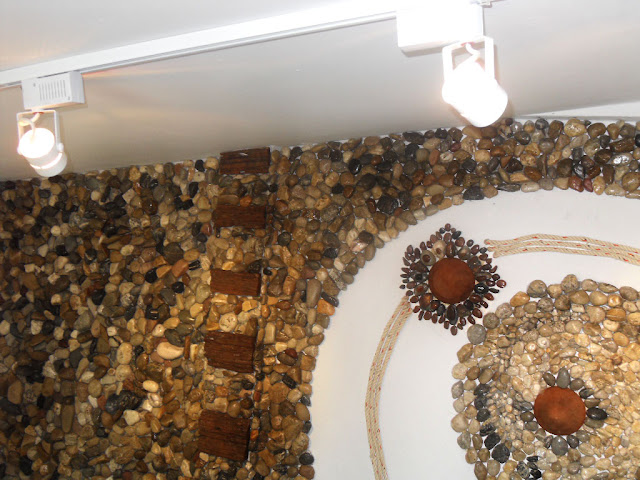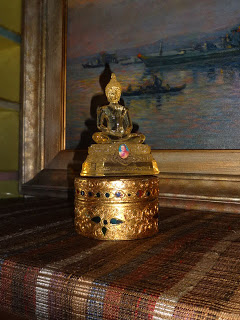 |
| Tsunamis by Janine |
 |
Tippanate Yaemmaneechai& Anurote Chanphopsri |
 |
 |
| Nude paintings Visoot Chareonporn : Lung Yai |
 |
| Nude Paintings : ลุงใหญ่ : วิสูตร เจริญพร |
Janine Yasovant
At the end of February 2013, I met two artists who received grants from "Silpa Bhirasri Creativity Grants" and both came to an auction of paintings in Chiang Mai. I immediately invited them for a brief interview. The first artist was Anurot Chanphosri about whom I wrote an article "Linen of the Remains" in Scene4. The second one was Tippanet Yaemmaneechai, a lecturer from the faculty of Painting, Sculpture and Printat Silpakorn University, Bangkok.
Our meeting point was at Wat Phra Singh temple. This is one of the temples that has famous and beautiful mural paintings. They were waiting for me at the small Buddhist assembly hall called Vihara Laikham behind the main temple. That day there was a large crowd visiting the temple. After that we decided to visit to the old Lanna capital Wieng Kum Kam in Saraphee district because both artists have not been there before and they were very eager to go. This interview on that day was mainly between me and Tippanet Yaemmaneechai.
JY: I have been writing about artists in Thailand for several years and many of them were the students of Professor Silpa Bhirasri. I knew that both of you graduated from Silpakorn University and also received excellent artist awards from Silpa Bhirasri Creativity Grants.
TN: I am sure that you have some background information about Professor Silpa Bhirasri. Actually, in 1933 Silpa Bhirasri and Phra Sarot Ratchataminman (a Thai noble) cofounded "Praneet Silpakam school" (the school of Fine Arts). Later, this school changed it's name to"Silpakorn School". silp-bhirasri-crSilpa Brirasri was the first president of this school since its inception from 1933 to 1942. Silpa Bhirasri and Phraya Anumanrachadhon persistently tried to improve the curriculum of this school. It wasn't until 1943, however, that the school eventually became a university called "Silpakorn University" and Phraya Anumanrachadhon was appointed the second president of this university from 1943 to 1949. At the same time, Silpa Bhirasri also became the first dean of the Faculty of Painting and Sculpture until his death in 1962. In my view, Professor Silpa Bhirasri was an Italian who devoted his life, soul, strength and money to help his students who worked with him. This is one of the reasons why he was admired, respected and trusted completely by every Silpakorn student. It is commonly accepted that he was really a great artist, a devoted teacher and a humanitarian.
JY: I knew that khun Visoot Charoenporn, his wife Penchan Premwut and Chakrabhand Posayakrit, the national artist in visual arts (Painting) in the year 2000 were once classmates in Silpakorn University. They were Silpa Bhirasri's students. What is your opinion about Professor Silpa Brirasri?
TN: Like all Silpakorn Students, I admired and respected Professor Silpa Brirasri so much. He was a role model for every artist who aspired to create outstanding art works and be a good person at the same time.
JY: I would like to know about the grant you obtained. Why is it so special for you and other artists?
TN: I was one of the nine people who received Silpa Bhirasri Creativity Grants 9th in the year 2009. From the year 2001 onwards, this award has been given to excellent artists every year and this year 2013 will be the time for Silpa Bhirasri Creativity Grants 13th. Many said that these awards are only given to artists who created superb quality art works. As Silpakorn students, everyone including me tried so hard to be chosen because we love and respect Professor Silpa Bhirasri.
JY: How you get inspiration for art works?
TN: When I was young I loved drawing and many years later I was a school representative for painting competitions on many occasions. Sometimes I got a prize but many times I did not win the competition. At that time I loved competition because it was so much fun and I was able to travel to many places.
Scene4 Magazine: The Arts of Thailand - Interview with Tippanet Yaemmaneechai | Janine Yasovant | April 2013 | www.scene4.comIn high school my study program was Sciences and Math, but I shifted my interest back to art which was also my favorite subject. I intended to enroll in the faculty of painting, sculpture and print at Silpakorn University but that day I was not sure whether I would qualify or not due to lack of preparation and training. Fortunately, the drawing test was a breeze because the model posture was the same one that I always use to practice my drawing skill.
The university life taught me so many valuable things. I studied various kinds of art, different artistic techniques and Thai traditional art. I found that Thai arts are precious and priceless and that the former generations passed on the cultural legacy and knowledge to the next promising generations.
This was the starting point for my inspiration in art creation and I would like to encourage every Thai person to appreciate Thai art and culture more than technological advancements.
JY: What is the vital thing in your recent works?
TN: They were made to reflect the thought that expresses Thai culture in the past and harmoniously blended with objects, materials from present technological products to show the ideas that are relevant to Thai cultural change in present society.
t01-cr
These sets of art works are techniques and methods-improvement from previous works such as "Cultural change in 1994 and imagery of new culture 1995 - 1999". Especially in these recent works, techniques, methods and material formation are more refined and professional. For the preparation of the working area, I tried to use the technique from Thai ancient artisans which employs whiting and Leucaena glue.
JY: I would like to know your aspect of art creation?
TN: The aspect was in the previous question that I said earlier. For the finished products, I would like everyone to see the new ways and progress in each work. Those improvements were better ideas, techniques and methods for finding the new dimensions in the artistic creation.
JY: What would you like to tell the world?
TN: I would like to tell about Thai culture's value which is like the spiritual representative in each period. It is a cultural heritage from the past passed down to the present as well as it nurtures the soul of people toward generosity and sympathy for each other to prevent competition, conflict and immoral personal benefits. In the present society many people believe in object value more than cultural value. This is the drive for my artistic creations.
My next art project is still in progress with technical research, method and form. I will use powder colors and oil colors together to create art works. Powder colors come from the nature and most mural paintings in Thai temples are mainly painted using powder color. However, oil colors are synthetic colors and made from a scientific method. This is the use of technology to make color and many artists in Western countries mainly use oil colors for painting. The combination of both types of color should work quite well. I am just thinking about how Eastern concept meets Western concept seamlessly to find more inspiration and extend my existing concepts from previous works.


















































































No comments:
Post a Comment